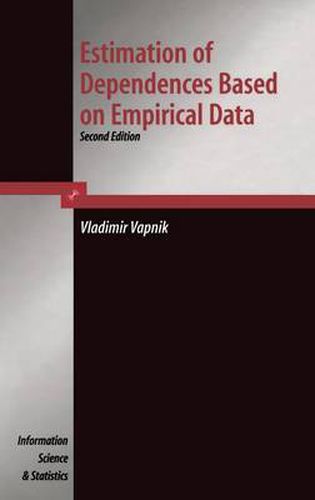Readings Newsletter
Become a Readings Member to make your shopping experience even easier.
Sign in or sign up for free!
You’re not far away from qualifying for FREE standard shipping within Australia
You’ve qualified for FREE standard shipping within Australia
The cart is loading…






This title is printed to order. This book may have been self-published. If so, we cannot guarantee the quality of the content. In the main most books will have gone through the editing process however some may not. We therefore suggest that you be aware of this before ordering this book. If in doubt check either the author or publisher’s details as we are unable to accept any returns unless they are faulty. Please contact us if you have any questions.
Twenty-?ve years have passed since the publication of the Russian version of the book Estimation of Dependencies Based on Empirical Data (EDBED for short). Twen- ?ve years is a long period of time. During these years many things have happened. Looking back, one can see how rapidly life and technology have changed, and how slow and dif?cult it is to change the theoretical foundation of the technology and its philosophy. I pursued two goals writing this Afterword: to update the technical results presented in EDBED (the easy goal) and to describe a general picture of how the new ideas developed over these years (a much more dif?cult goal). The picture which I would like to present is a very personal (and therefore very biased) account of the development of one particular branch of science, Empirical - ference Science. Such accounts usually are not included in the content of technical publications. I have followed this rule in all of my previous books. But this time I would like to violate it for the following reasons. First of all, for me EDBED is the important milestone in the development of empirical inference theory and I would like to explain why. S- ond, during these years, there were a lot of discussions between supporters of the new 1 paradigm (now it is called the VC theory ) and the old one (classical statistics).
$9.00 standard shipping within Australia
FREE standard shipping within Australia for orders over $100.00
Express & International shipping calculated at checkout
This title is printed to order. This book may have been self-published. If so, we cannot guarantee the quality of the content. In the main most books will have gone through the editing process however some may not. We therefore suggest that you be aware of this before ordering this book. If in doubt check either the author or publisher’s details as we are unable to accept any returns unless they are faulty. Please contact us if you have any questions.
Twenty-?ve years have passed since the publication of the Russian version of the book Estimation of Dependencies Based on Empirical Data (EDBED for short). Twen- ?ve years is a long period of time. During these years many things have happened. Looking back, one can see how rapidly life and technology have changed, and how slow and dif?cult it is to change the theoretical foundation of the technology and its philosophy. I pursued two goals writing this Afterword: to update the technical results presented in EDBED (the easy goal) and to describe a general picture of how the new ideas developed over these years (a much more dif?cult goal). The picture which I would like to present is a very personal (and therefore very biased) account of the development of one particular branch of science, Empirical - ference Science. Such accounts usually are not included in the content of technical publications. I have followed this rule in all of my previous books. But this time I would like to violate it for the following reasons. First of all, for me EDBED is the important milestone in the development of empirical inference theory and I would like to explain why. S- ond, during these years, there were a lot of discussions between supporters of the new 1 paradigm (now it is called the VC theory ) and the old one (classical statistics).